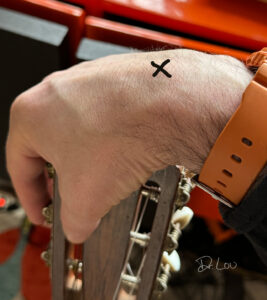Musicians and Carpal Boss: A Discordant Duet
For musicians, their hands (and minds) are their most valuable tools. Whether they play the piano, guitar, violin, or any other instrument, the intricate movements required demand a high level of hand and thumb dexterity. What is carpal bossing? This is an accurate description taken from wikipedia: “Carpometacarpal bossing (or metacarpal/carpal bossing) is a small, immovable mass of bone on the back of the wrist. The mass occurs in one of the joints between the carpus and metacarpus of the hand, called the carpometacarpal joints, where a small immovable protuberance[1] occurs when this joint becomes swollen or bossed.”

Call Dr. Lou! (207) 774-6251
Carpal Boss(ing) can be especially troublesome for musicians, as it directly impacts their ability to perform. Here are some of the challenges they face:
Confusion: The difference between a carpal boss and a ganglion cyst is that a carpal boss is a hardened area, while a ganglion cyst feels softer to the touch. This is because it contains a jelly-like fluid rather than a bony substance. If you try to use the “bible method” of pounding a ganglion cyst on a carpal boss, you will likely have a very unpleasant, unsuccessful, destructive experience. Proper diagnosis is essential for proper treatment.
Pain and discomfort: Musicians often experience pain at the base of the thumb, which can be debilitating during long practice sessions or performances.
Reduced flexibility: The gradual loss of thumb movement and flexibility can hinder a musician’s ability to execute intricate fingerings and chords. It also creates what’s sometimes called proprioceptive confusion. Your thumbs have very important position receptors that tell the body about what is going on. Disruption to these receptors could lead to inefficient playing.
Weakened grip: A weak grip can make it difficult to hold and control instruments effectively, which can significantly affect a musician’s performance quality.
Frustration and mental stress: Dealing with physical pain and limitations can lead to emotional stress, potentially affecting a musician’s overall mental well-being and creativity.
Fear of surgery: Fear of surgery is a legitimate concern. Any time living human tissue is cut, it forms scars and inflammation. Not all surgeries fail, obviously, but in a space as restricted as your hand, and given that musicians need their hands, trying to avoid surgery and possible irreversible consequences, is a wise approach. As they say in Maine, “Before you let them cut you, let Dr. Lou Adjust you!”
Mitigating Carpal Boss Effects
While Carpal Boss can be challenging for musicians, there are several strategies they can employ to mitigate its effects:
Hand exercises: Physiotherapy exercises prescribed by your specialist, designed to strengthen and improve the thumb’s range of motion, can be beneficial.
Ergonomics: Musicians should pay attention to their playing posture, hand positioning, and instrument setup to reduce strain on the thumb joint. This includes sleeping ergonomics and hand and arm position while resting.
Wrist support: Using wrist supports or braces during practice or performances can help reduce thumb joint strain. Wearing supportive bracing while sleeping can prevent night time irritation. I recommend this wrist brace by Mueller.
Medication: Medication is going to do nothing for the bony structural arthritis like changes that have occurred with carpal bossing. Over-the-counter or prescription anti-inflammatory medications may alleviate pain and reduce inflammation, but will not change bony structure. If the pain relief of medications allows you to work through the injury, you should be aware that you may be creating more longterm damage by ignoring your symptoms.
Rest and recovery: Musicians should incorporate adequate rest periods into their practice routines to allow their hands to recover and prevent overuse.
Adaptations and instrument modifications: Some musicians may need to adapt their playing techniques or consider instrument modifications that reduce stress on the thumb joint.
Consult a medical professional: If the condition worsens, seeking advice from a medical professional or hand specialist is essential. Consulting a chiropractor who specializes in musician injuries, and in this case the hands, could lead to better feeling, function, and future of the affected hand. When joints become rigid and restricted from repetitive stress, mobilization of those joints may speed up your recovery and reduce the likelihood of longterm disability of the hand.
Conclusion
Carpal Boss is a challenging condition that can affect musicians’ ability to play and express themselves through their art. However, with proper care, exercises, and ergonomic adjustments, musicians can mitigate its effects and continue pursuing their passion for music. It’s important to prioritize hand health, seek professional guidance when needed, and remember that the love for music can always find a way to harmonize with life’s challenges. After all, the show must go on, and the music must play on.
Dr. Lou Jacobs is a chiropractor and acupuncturist in Portland, Maine who is well into his third decade of working with musicians of all levels. He has worked with some of the worlds best guitar players, and was recently interviewed in Guitar Player Magazine (March 2023). While not isolated in Portland, Maine, he does still offer consulting online for musicians who live outside of Maine and New Hampshire. For information on consulting or to schedule an appointment, call (207) 774-6251.
